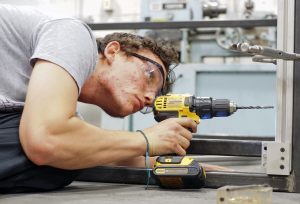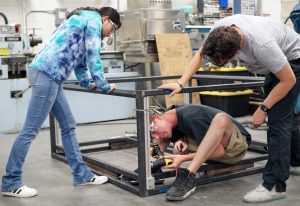“We came up with interdisciplinary senior capstone projects that would give students the experience of hands-on application of their studies through real-world engineering projects. We also wanted the projects to support our program’s long-term curricular efforts,” said Nogales.
Capstone projects are the culminating experience of all engineering undergraduates’ academic life, giving them an opportunity to apply the knowledge gained through coursework to solve a real-world problem through engineering design. Teams of seniors collaborate on projects in their final semester. They design, build and test their innovations under the supervision of professors.
Traditionally, capstone projects were confined to one discipline. However, in an effort to modernize the curriculum, the Engineering Technology capstone projects involve students from mechanical engineering technology, electronics and computer engineering technology, and information technology. “The interdisciplinary skill set empowers the teams to tackle more complex projects. In the end, students learn how to leverage each other’s strengths and be a contributing member of a diverse team,” emphasized Nogales.
One project involves reverse engineering, building, and testing equipment used for demonstrating heat propagation in a fin. Another entails the rehabilitation of an old refrigeration cycle demonstration unit. Both of these will yield curricular tools that can be used to teach students about heat transfer and thermodynamics.
Students will also refurbish and improve an injection molding machine that is no longer operable.
“Not only will students studying manufacturing processes learn about injection molding, but researchers from throughout the college will be able to make samples of plastic materials to test their various properties,” said Nogales.
“The biggest project, and an audacious goal, is to design and build a computer-controlled machine with detachable modules, so that the CNC machine could be used as a router, plasma cutter, and exploring new 3D printing methods,” said Nogales.
Charlie Park, who has been instrumental in getting the projects defined and manufactured, has been guiding students in the MTEC shop, who are currently building a prototype CNC machine and bench models to test concepts for the bearing system and frame. The knowledge gained this semester will be used next fall to finalize the design and manufacture a new modular CNC system.
Students are taking manually operated devices and computerizing them to hold libraries of tasks and settings on all of these devices. This requires a multidisciplinary approach, and provides an opportunity for students from different engineering disciplines to work together.
“This is invaluable to the students—it’s just like having a job,” explained Nogales. “In addition to using their technical knowledge, they have to develop budgets, work in teams, and present their work for review on a regular basis. It’s a big win-win because employers, like Cummins, will have new hires who hit the ground running.”
Nineteen students are currently working on the projects, but the equipment they develop will be used in the classroom by many future students.
“The biggest return for Cummins is having a bigger presence on campus,” said Navarrete. “We’ve now expanded our recruiting to the Business College. The students we hire from NMSU have a strong work ethic, good technical skills and come from a diverse background making them well-rounded employees. We will continue hiring students, participating in resume reviews and other activities. But in the end, we want to enrich the students’ education. Even if we don’t hire them, we want them to get hired somewhere.”


